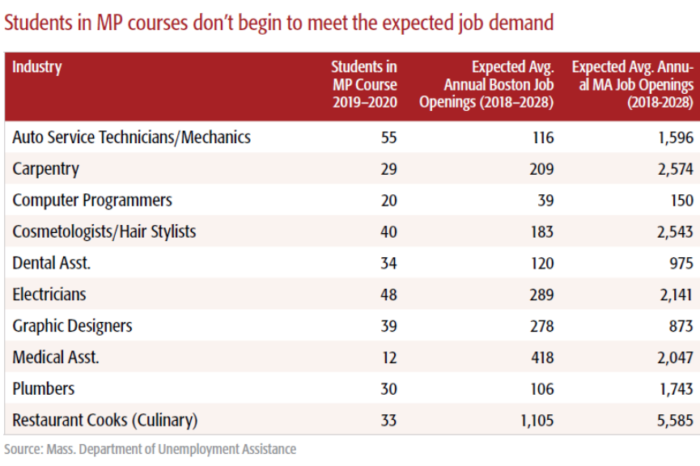Key Madison Park Program Lags Other State Voc-Techs, but Shows Signs of Improvement
Read coverage of this report in The Boston Globe.
Co-operative education program far behind in terms of student placements, employer contacts
BOSTON – The co-operative education program at Boston’s Madison Park Technical Vocational High School, which places students in paid positions with local employers, lags far behind other Massachusetts vocational-technical schools in terms of both placements and number of employer contacts. But with the school as a whole beginning to improve after years of turmoil, the co-op is also showing promising signs, according to a new study published by Pioneer Institute.
“Madison Park has a key role to play in growing the Greater Boston economy,” said Pioneer Executive Director Jim Stergios. “But to reach that potential and, importantly, to create a bridge for low-income students to enter the middle class, the school must succeed in connecting its students to area employers.”
The state Department of Elementary and Secondary Education designated Madison Park as underperforming in 2016; implementation of a turnaround plan began that June. Since then, the school has shown signs of improvement. The graduation rate has risen from 57 percent in 2017 to more than 68 percent in 2019. Over the same period of time, the dropout rate has fallen from over 6 to less than 5 percent. Enrollment, which fell by half from 2005 to 2017, has since then risen by more than 17 percent.
Over 90 percent of Madison Park’s slightly more than 1,000 students are designated as “high needs,” meaning they are at risk of educational failure or otherwise in need of special assistance and support. About 97 percent of the students are of color, 35 percent are English language learners, and more than 30 percent have disabilities.
In “Madison Park II: Capitalizing on Employment Opportunity,” author William Donovan reports that students become eligible for the co-op program in the third quarter of junior year, after they complete the required number of course hours. To qualify, students must have a B average in the discipline in which they seek placement, at least a C average overall and a recommendation from a shop instructor.
Among the 25 regional voc-techs reporting on the 2018-19 school year (Madison Park is part of Boston Public Schools and not a regional school), an average of 28 percent of juniors and seniors were in co-op placements, with the range spanning from 13 to nearly 54 percent. During the same year, Madison Park’s placement rate was 4.2 percent.
Madison Park’s placement rate improved to 8.1 percent the following year (2019-2020), but lagged far behind Shawsheen Valley Regional Vocational Technical High School in Billerica, which led all Massachusetts voc-techs with 68 percent of its juniors and seniors placed in co-op positions.
Madison Park Executive Director Kevin McCaskill identified two reasons that partly account for the low numbers. One is attendance. The average student attendance rate at Madison Park is 87 percent, and the school can’t recommend students with irregular attendance records to be placed with employers. The other is students’ need for academic support. After-school academic support needed to meet graduation requirements is a higher priority than the co-op.
Lack of industry connections has also been a problem. Shawsheen works with 150-180 employers annually and Northeast Metropolitan Regional Vocational High School in Wakefield works with around 40. LaTrelle Pinkney-Chase, who was hired to direct Madison Park’s co-operative education program in 2019, says she is working with 20.
But the Career Champions Network, a group of more than 40 business leaders, has pledged to use their contacts and experience to support the growth of Madison Park’s career vocational-technical educational (CVTE) programs. In November, Pinkney-Chase and the network developed an action plan aimed at increasing the number of employers the co-op works with by 50 before the end of the school year.
Previously the co-op had focused on just a few of Madison Park’s 20 CVTE programs. But with the creation of a computer programming and web development program and the return of a heating, ventilation and air conditioning program, the school is working to diversify the co-op program with additional high-demand sectors.
Pinkney-Chase now holds Zoom calls with freshmen to make them aware of the co-op and requirements for participation. She receives lists from teachers of students who are eligible or close to meeting the co-op’s eligibility requirements and reaches out individually to talk to them about the program.
She conducts “spotlight interviews” with students who are in the program to talk about their co-op experiences. All students receive an e-blast notification when the interviews are posted on the school’s YouTube channel.
Donovan urges Madison Park to recruit recent graduates who participated in co-operative education to come back and promote the program. He also suggests engaging students in the school’s marketing major to help promote the program.
This is the second of two Pioneer reports on Madison Park. The first, published in September, examined the school’s turnaround plan and reported on its progress as judged by a 10-year review conducted by the New England Association of Schools and Colleges.
About the Author
William Donovan is a former staff writer with the Providence Journal in Rhode Island where he wrote about business and government. He has taught business journalism in the graduate programs at Boston University and Northeastern University. He received his undergraduate degree from Boston College and his master’s degree in journalism from American University in Washington, D.C.
About Pioneer
Pioneer’s mission is to develop and communicate dynamic ideas that advance prosperity and a vibrant civic life in Massachusetts and beyond.
Pioneer’s vision of success is a state and nation where our people can prosper and our society thrive because we enjoy world-class options in education, healthcare, transportation and economic opportunity, and where our government is limited, accountable and transparent.
Pioneer values an America where our citizenry is well-educated and willing to test our beliefs based on facts and the free exchange of ideas, and committed to liberty, personal responsibility, and free enterprise.
Get Updates on Our Education Research
Related Posts:







